Father Lincoln
Father Lincoln
The Untold Story of Abraham Lincoln and His BoysRobert, Eddy, Willie, and Tad
Alan Manning
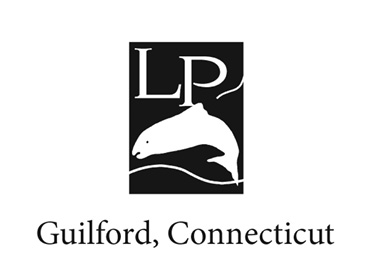

An imprint of Rowman & Littlefield
Distributed by NATIONAL BOOK NETWORK
Copyright 2016 by Alan Manning
All rights reserved. No part of this book may be reproduced in any form or by any electronic or mechanical means, including information storage and retrieval systems, without written permission from the publisher, except by a reviewer who may quote passages in a review.
British Library Cataloguing in Publication Information Available
Library of Congress Cataloging-in-Publication Data available
ISBN 978-1-4930-1823-9
ISBN 978-1-4930-1824-6 (e-book)
 The paper used in this publication meets the minimum requirements of American National Standard for Information SciencesPermanence of Paper for Printed Library Materials, ANSI/NISO Z39.48-1992.
The paper used in this publication meets the minimum requirements of American National Standard for Information SciencesPermanence of Paper for Printed Library Materials, ANSI/NISO Z39.48-1992.
I would like to dedicate this book to my inspirations and the loves of my life: my wife Karen and my four daughters, Sarah, Kate, Elizabeth, and Mary Grace. And to those who helped shape my character: my mother, Krystle Manning; my father, Albert V. Manning; my grandfather, Albert Manning; and my uncle, Forrest Brown.
Contents
Introduction
On the afternoon of May 30, 1922, while most Americans were home for the Memorial Day holiday, more than three thousand invited guests and thirty thousand spectators gathered in Washington, DC, for the dedication of the recently completed Abraham Lincoln Memorial. The invited guests, each of whom had received an engraved invitation according them special seating on or near the memorial structure, included President Warren G. Harding and members of his cabinet, congressmen, governors, justices of the Supreme Court, military officers, diplomats, civic leaders, various distinguished citizens, and a handful of Civil War veterans from both the Union and Confederate armies, most of whom were now in their seventies and eighties. The ordinary spectators, who stood spread out across the vast grounds of the memorial and the reflecting pool leading to the Washington Monument, more closely represented the century-and-a-half-old nation: young and old, men and women, black and white, farmers, factory workers, clerks, housewives, and immigrants. Also present in the crowd were hundreds of former slaves and descendants of slaves.
Fifty-seven years had passed and three generations of Americans had been born since John Wilkes Booth, an angry Confederate sympathizer, assassinated Abraham Lincoln just days after General Robert E. Lee surrendered to General Ulysses S. Grant at Appomattox Court House, Virginia, effectively ending the nations bloodiest war. During that time, America had transformed itself into an industrial power, asserted economic and political influence abroad, fought in a world war, and struggled with domestic upheavals over equal rights for blacks and labor rights for an increasingly urbanized workforce. America at the time of the dedication of the Lincoln Memorial was not the America of Lincolns time. Yet on that day, the past and the present came together to honor the nations sixteenth president.
One of the invited guests present on that beautiful spring day was seventy-eight-year-old Robert Todd Lincoln, the eldest and only surviving son of Abraham Lincoln. Except for having a beard, the gray and bespectacled Robert bore no physical resemblance to his famous father. With a rounded face featuring a wide nose and a short and stocky frame, which was by then slightly stooped with age, Robert more closely resembled his plump and fleshy mother than his six-foot-four father with his gangly arms and chiseled cheekbones. In further contrast to his father, whose dress was often awkward and careless, Robert was scrupulously fashion conscious. On this special day he wore a top hat, a crisply pressed white shirt, and a perfectly tailored black suit with a gold watch chain hanging prominently from his vest.
Assisted by two young marines, one on each side, Robert slowly climbed the fifty-eight granite steps leading to the east colonnade on the main level of the memorial, where the speakers and other special guests were seated in dark wooden Thonet cafe chairs. When Robert finally reached the top at about 2:30 p.m., the crowd burst into applause as he took his seat beside Mary Harlan Lincoln, his wife of more than fifty years and the daughter of a former United States senator from Iowa. Behind Robert, set back within the central chamber of the memorial and facing outward to the crowd, was the nineteen-foot-high statue of the seated Lincoln, painstakingly carved from the finest Georgia white marble. The statue aptly represented the larger-than-life figure that Lincoln had become in the eyes of most Americans.
Following the invocation and the presentation of colors, Dr. Robert R. Moton, who had succeeded Booker T. Washington as leader of the Tuskegee Institute, delivered the principal dedication address. The only black man on the speakers platform, Moton focused his speech on Lincolns impact on black Americans, fully crediting Lincoln with emancipation of the slaves and holding Lincoln up to a standard of immortality. With his voice being broadcast over amplification speakers placed around the memorial groundsrepresenting the latest in oratorical technologyMoton said of Lincoln that [h]e freed a nation as well as a race.... Sixty years ago he stood in lonely grandeur above a torn and bleeding Nation, a towering figure of patient righteousness. Today his spirit animates the breasts of millions of his countrymen who unite with us to pay tribute to his lofty character and his immortal deed.
Poet Edwin Markham followed Moton with his own graceful tribute to Lincoln, entitled Lincoln, The Man of the People, which included these lines:
When the Norn Mother saw the Whirlwind Hour
Greatening and darkening as it hurried on,
She left the Heaven of Heroes and came down
To make a man to meet the mortal need...
And laid upon him a sense of the Mystic Powers
Movingall hushtbehind the mortal veil,
Here was a man to hold against the world,
A man to match the mountains and the sea.
Former President William Howard Taft, who was by then the chief justice of the United States Supreme Court, spoke next. Taft accurately described the heights to which Americans had elevated Lincoln: We feel a closer touch with him than with living men. The influence he still wields, one may say with all reverence, has a Christ-like character. It has spread to the four quarters of the globe. The oppressed and lowly of all peoples, as liberty and free government spread, pronounce his name with awe, and cherish his assured personal sympathy as a source of hope.
Ironically, it was President Harding, widely known for his bombastic and often wandering oratory, who added some historical perspective to Lincolns role in emancipation by acknowledging that Lincoln initially saw preservation of the Union as more important than abolishing slavery:
The simple truth is that Lincoln, recognizing an established order, would have compromised with the slavery that existed, if he could have halted its extension.... Hating human slavery as he did... he was the last man in the Republic to resort to arms to effect its abolition.... He believed... firmly in the perpetuity of the Union of the States.... His was a leadership for a great crisis, made loftier because of the inherent righteousness of his cause and the sublimity of his own faith. Washington inspired belief in the Republic in its heroic beginning, Lincoln proved its quality in the heroic preservation.
Next page
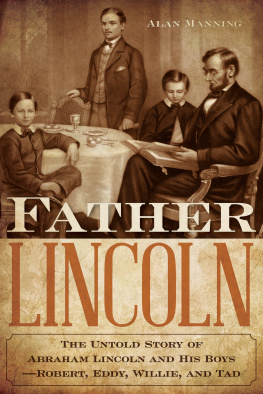
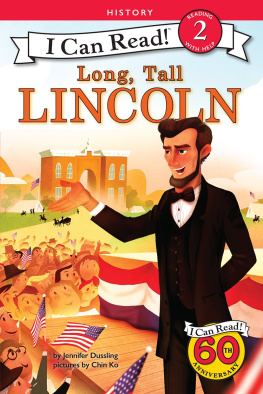
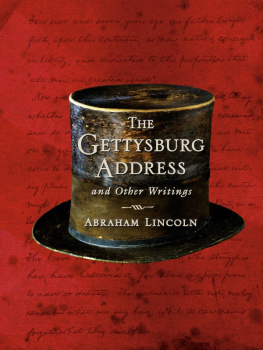
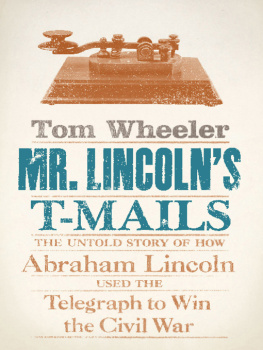
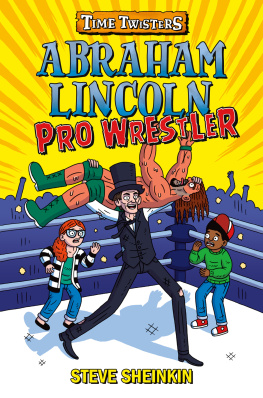
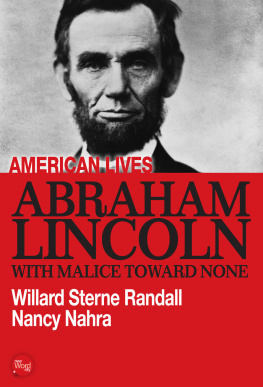


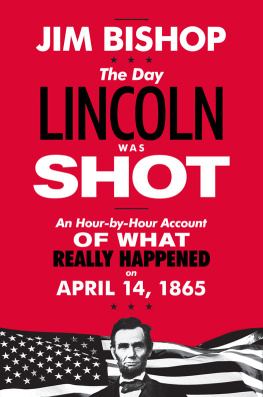
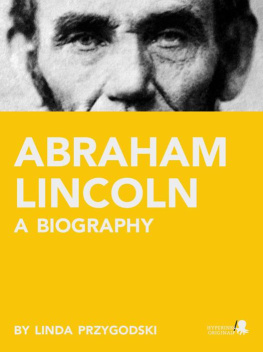

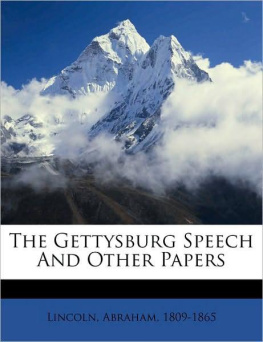


 The paper used in this publication meets the minimum requirements of American National Standard for Information SciencesPermanence of Paper for Printed Library Materials, ANSI/NISO Z39.48-1992.
The paper used in this publication meets the minimum requirements of American National Standard for Information SciencesPermanence of Paper for Printed Library Materials, ANSI/NISO Z39.48-1992.